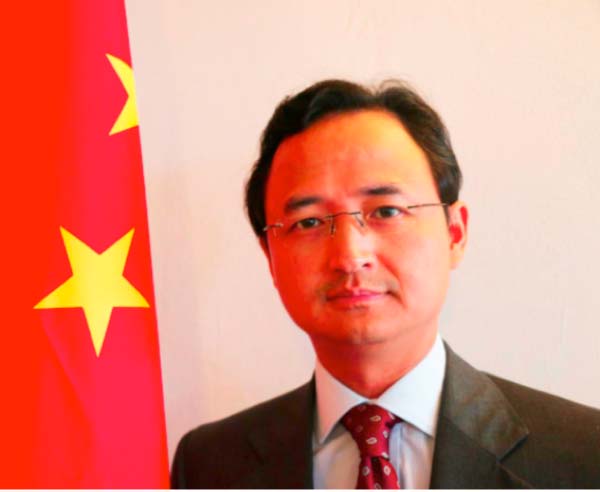
The new round of industrial revolution, arising in the era of economic globalization, has given a strong boost to economic growth of almost all countries. However, if not managed properly, it may also lead to lack of inclusiveness in growth. Realizing inclusiveness and achieve sustainable development are the two sides of the same coin.
Promoting
inclusive growth in our times calls for upholding economic globalization, a
process which is not all smooth sail and without challenges of various forms.
What is important is to better adapt to and steer economic globalization
forward and promote trade and investment liberalization and facilitation.
Better institutional arrangements incentivizing efficiency and equity need to
be put in place, opportunities for equal participation by all need to be
provided, more support to vulnerable groups need to be given, and a model of
balanced and inclusive growth need to be developed.
China
has been actively pursuing inclusive growth at home. Inclusive growth in China
is an important reason why China’s economy maintains steady growth over the
years despite the sluggish world economy. In keeping with the principles of
innovative, coordinated, green, open and shared development, China has
highlighted inclusiveness in its development strategies, and worked to promote
inclusive growth through providing institutional guarantee and policy support.
This has helped to blaze a path of inclusive growth with distinctive Chinese
features.
China
gives priority to employment. Employment is the foundation for inclusive
growth. China has a workforce of over 900 million. Every year, about 13 million
students graduate from colleges and secondary schools. A large number of rural
surplus workers migrate to towns and cities for job opportunities. China has
been implementing a proactive employment policy, encouraging job creation by
business start-ups, and extending support for key groups such as college
graduates and assistance to groups struggling for jobs. Over the past few
years, over 13 million new urban jobs have been created annually, and surveyed
urban unemployment rate has been kept at around 5%. This is a truly remarkable
achievement for a major developing country with more than 1.3 billion people.
China
encourages more people to go for entrepreneurship and innovation. In recent
years, China has earnestly implemented the strategy of innovation-driven
development, and promoted mass entrepreneurship and innovation. These efforts
have yielded better-than-expected results. China’s entrepreneurship and
innovation are based on extensive participation. Not only are enterprises and
research institutions engaged in this effort, but more and more ordinary people
are also joining in. For the past three years, an average of over 40,000 new
market entities have been set up every day, including some 14,000 newly registered
enterprises. China’s entrepreneurship and innovation are driven by cooperation
among different market entities. Built are many open and sharing platforms
where innovators of various kinds interact online and offline, making
entrepreneurship and innovation more efficient, less costly and faster. China’s
entrepreneurship and innovation have delivered benefits to all. The new
industries, new business forms and models that have emerged in this process
have not only made people’s lives more convenient, but also created a large
number of jobs, giving more people the opportunity to better their livelihood.
China’s entrepreneurship and innovation have greatly advanced economic
transformation and upgrading. It has brought about fast growth of emerging
industries and re-energized traditional ones, boosting new driving forces for
development.
China
is making relentless efforts to raise the standards of basic social welfare for
its people. Three major social safety nets covering the entire population have
been put in place, i.e., basic pension, basic health care and compulsory
education. In the past 40 years, over 700 million Chinese have been lifted out
of poverty, a miracle of poverty reduction in the history of humanity. China is
making further efforts in targeted poverty alleviation and elimination with the
goal of helping the remaining over 40 million rural poor to rid themselves of
the shackles of poverty by 2020. In the past eight years, China invested nearly
one trillion US Dollars to ensure proper housing for over 80 million urban
people by rebuilding more than 30 million run-down housing units. This is
equivalent to housing the whole population of a relatively big country.
Inclusive
growth in China helps people live a better life and with dignity, endows its
social economic development with more vigor and sustainability. Nevertheless,
China is still a developing country, much more needs to be done in its arduous
drive to achieve modernization and common sharing of development benefit by all
people.
As
a Chinese saying goes, sea is big as it can hold the water from all directions,
man is great when tolerant and inclusive. A more inclusive world is surely more
magnificent and China is willing to work with all including African countries
to achieve inclusive growth in face of a new round of industrialization in the
era of economic globalization.
By
H.E. ZHANG Jiming, Ambassador of the People’s Republic of China to The
Gambia
Read Other Articles In Article (Archive)
President Jammeh Academy proprietress speaks
Oct 9, 2012, 12:27 PM


